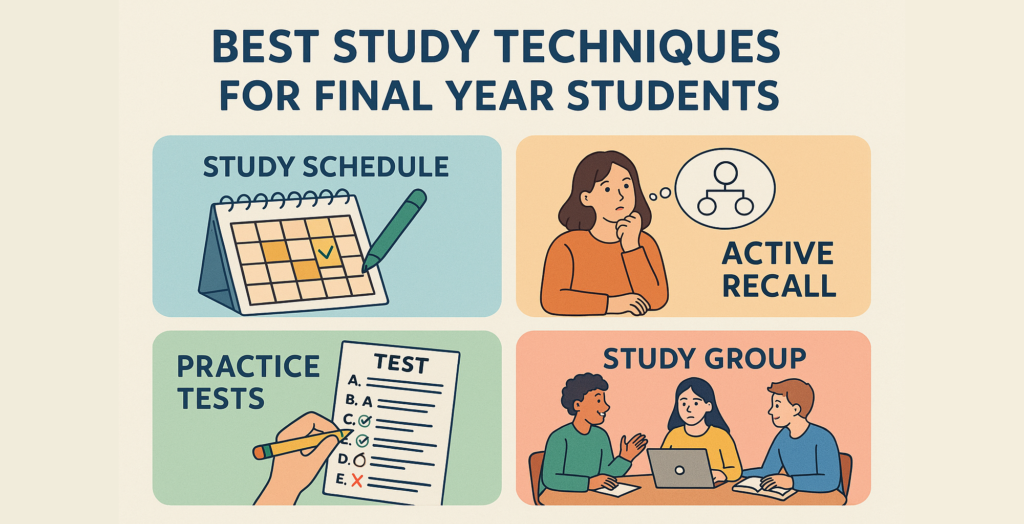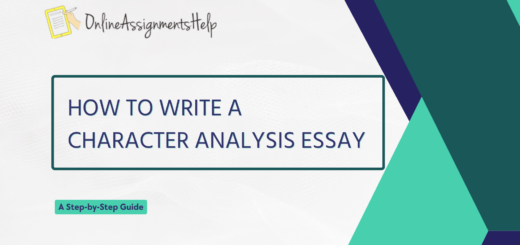Final Year Study Tips That Actually Work
The final year can feel like everything is happening at once. You’ve got exams coming up, projects due, maybe even job interviews or internships. It’s a lot. The pressure can be real, but managing your time and studying the right way can reduce stress and help you stay on track.
Here are some simple study techniques that can make things a bit easier during your final year.

1. Create a Study Plan That Works
One of the best things you can do is organise your time. Start by writing down your deadlines—exams, assignments due dates, and presentations—and build your study schedule around them.
You don’t need to make it fancy. A basic notebook or a digital calendar will do. Just make sure it’s realistic. Don’t pack your day with 10 hours of studying if you know that’s not going to happen. Even 2–3 focused hours a day can be more useful than trying to cram everything in one weekend.
2. Try the Pomodoro Method
This technique is super simple. You study for 25 minutes, then take a 5-minute break. After four sessions, you take a longer break, like 15 or 20 minutes.
It’s good because you’re not forcing your brain to stay focused for hours at a time. The short breaks give you time to relax, so you don’t feel burned out by the end of the day.
3. Focus on Understanding, Not Just Memorising
If you’re spending hours repeating sentences without really knowing what they mean, it’s time to switch up your method. Instead of memorising word for word, try to explain the concept to yourself in your own words.
Better yet, try teaching it to a friend or family member. If you can break it down and explain it easily, chances are you’ve understood it.
4. Use Visual Tools
Some students understand things better with visuals. If you’re one of them, tools like mind maps, charts, and diagrams can help you remember complicated stuff more easily.
Even simple sketches or handwritten notes can be powerful. Don’t worry about making them perfect—they’re just for you.
5. Practice with Past Exam Papers
If you haven’t already, get your hands on past years’ papers. They’ll give you an idea of how questions are asked, how marks are split, and which topics show up often.
Once you’re confident with a topic, time yourself and solve a full paper like it’s the real exam. It helps with time management and gives you a feel for what to expect.
6. Use Group Study Carefully
Studying in a group can help when it’s productive. You can quiz each other, solve doubts faster, or explain tricky parts to someone else.
But it can also be a distraction if it turns into more chatting than studying. If you’re doing group study, have a goal for the session. Set a timer. Agree on what you’re going to cover—and stick to it.
7. Spend Extra Time on Weak Subjects
It’s easy to spend most of your time on subjects you’re already good at. But that won’t help your overall grades.
Instead, be honest with yourself. Which subjects or topics do you find hard? Spend more time on those. You don’t need to master everything in a day—just work through them one bit at a time.
8. Block Out Distractions
If you keep checking your phone every few minutes, your study session won’t go far. Try putting your phone in another room or turning off notifications. If you need to use your laptop, close unnecessary tabs and avoid logging into social media.
There are even apps that can block certain websites for a set time if you need help with focus.
9. Take Care of Your Health
When you’re running low on sleep or skipping meals, your brain doesn’t work as well. Try to eat properly, stay hydrated, and get at least 6 to 8 hours of sleep. Even a short walk or a few stretches during breaks can refresh your mind.
You don’t need to go on a full fitness routine—just take care of the basics.
10. Don’t Leave Everything for the Last Night
We’ve all done it at some point—stayed up all night trying to read three chapters in one go. It’s not fun, and it usually doesn’t work well.
Instead of cramming, try to do small bits every day. Use the night before your exam to revise, not to learn things for the first time. Go over summaries, formulas, and notes. And sleep early so your brain can function the next day.
11. Ask for Help If You Need It
No rule says you have to figure everything out alone. If you’re stuck, ask your teacher, a classmate, or even look for explanations online.
And if you’re short on time or feeling overwhelmed by assignments or reports, you can also get academic help online. There are legit websites that can support you without you having to panic last minute.
Final Thoughts
The final year is important, but you don’t need to make it harder than it already is. Take it one step at a time. Use these study techniques, find what works for you, and be consistent. A few good habits can save you a lot of stress later.
And if assignments start piling up or you’re just stuck with writing tasks, we’ve got your back.



